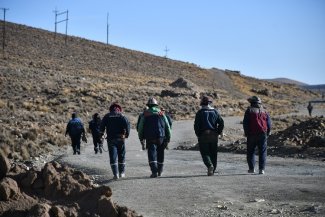
Monday, 22 June 2020. Around sixty lawyers and presidents of bar associations, who arrived on foot from all over the country, are prevented from entering the Turkish capital of Ankara. Police allowed the protesters, who were demonstrating against a government plan to reform bar associations, to enter the city after a 24-hour wait.
Since January 2020, two Turkish lawyers have been on a hunger strike. Their colleague Şerife Ceren Uysal, speaking by telephone, does not hide her concern: “Ebru started on 3 January, 30 days before Aytaç. She lost a lot of weight and now weighs 42 kilos. Both of them are in critical condition,” she tells Equal Times in early June.
Uysal, who currently resides in Vienna, closely follows the situation with Ebru Timtik and Aytaç Ünsal, who have been in prison for just over a year. Like them, she is a member of the Progressive Lawyers Association (Çağdaş Hukukçular Derneği, or ÇHD), founded in 1974. A lawyer specialising in labour law for more than 10 years in Turkey, she joined when she was a student. “I always believed that the association was important in Turkey, especially for the defence of human rights.” As a member of the executive committee, she worked pro bono defending people who were imprisoned or tortured.
Everything changed for her after the failed coup d’état of July 2016. When a state of emergency was declared three days later, Uysal left Turkey.
“The situation was uncomfortable and I felt that if I stayed, I was at risk of being prosecuted. I didn’t want to have to choose between prison and being banned from leaving the country.”
In November 2016, three months after her departure, the association of lawyers with which Uysal continued to be involved, the oldest in the country, was dissolved and labelled a “terrorist organisation” by the Turkish government. In March 2019, 18 of its members, including six who had been detained for more than a year, were accused by the Turkish authorities of “belonging to a terrorist organisation” and given sentences ranging from three to 18 years in prison.
“Ebru and Aytaç went on hunger strike to demand the right to a fair trial,” explains Uysal before listing the numerous irregularities of their hearing: the court refused to let the defence challenge allegations made by witnesses, collect evidence presented by defence lawyers or hear pleas.
“For me, the most important thing to remember is that in 2018, a first court ordered their release. But two days later, the judges who made that decision were replaced by others,” says Uysal.
Lawyers identified with their clients’ causes
On 8 June, when the supreme court announced that it had begun to examine the appeal of the 18 ÇHD lawyers, the minister of the interior sent a nearly 76-page document to the Turkish media. In the report, read by Equal Times, the Marxist-Leninist Revolutionary People’s Liberation Party/Front (Devrimci Halk Kurtuluş Partisi-Cephesi or DHKP-C) is presented as a terrorist organisation that the government is trying to dissolve. The political band Grup Yorum is accused of being part of this organisation, along with Timtik and Ünsal, lawyers for the regularly-imprisoned musicians. The hunger strikes, which recently claimed the lives of two band members, as well as those undertaken by the two lawyers, are considered by the government to be “terrorist acts.”
“The biggest problem in Turkey today is that lawyers are being identified with their clients,” human rights lawyer Ayşe Acinikli tells Equal Times. As she explains, this runs counter to the UN’s Basic Principles on the Role of Lawyers, according to which lawyers may not be identified with their clients or their clients’ causes.
Acinikli, who adds that there is no serious evidence that they belong to the organisation, has first-hand experience: in March 2016, she herself was accused of belonging to a terrorist organisation for having defended colleagues on trial for their defence of Abdullah Öcalan, former head of the Kurdistan Workers’ Party (PKK). She spent five months behind bars, where she shared a cell with the novelist Aslı Erdoğan. Though she is now free, her trial is ongoing.
“In Turkey, being accused of membership of a terrorist organisation is a common accusation against those working to defend human rights or on other political matters,” explains Acinikli. “The government doesn’t want us to defend such cases, it’s their way of preventing us from doing our work.”
While lawyers in Turkey faced such charges before the attempted coup of 2016, prosecutions have since increased dramatically. According to the Arrested Lawyers Initiative, more than 1,500 lawyers have been prosecuted for membership of a terrorist organisation since the failed coup. In a February 2020 report, they state that thus far 345 lawyers have been sentenced to 2,158 years of prison.
“I was shocked to see the state of the rule of law in Turkey,” International Bar Association (IBA) director Helena Kennedy tells Equal Times. “Criminal law and terrorism legislation allow for arrests to be justified and lawyers criminalised for simply exercising their profession. Infractions are vaguely defined and there is an absence of clear evidence, which is what happens in oppressive regimes around the world.”
Judges under Erdoğan’s thumb
“Very often, in political cases, it seems like judges make decisions based on what they think Erdoğan would do,” Acinikli tells Equal Times.
Indeed, the dismissal of nearly a third of the country’s magistrates following the attempted coup of July 2016 led to the appointment by the Council of Judges and Prosecutors (Hâkimler ve Savcılar Kurulu or HSK) of magistrates close to the AKP. Since the constitutional referendum of 2017, the HSK – made up of 13 members, of which six are named by the president of the republic and seven by parliament – has been under Erdoğan’s thumb.
“Today we are faced with incompetent judges and prosecutors. They’re young and don’t know the law,” says Acinikli. As she explains, in order to be admitted to the oral part of the judicial exam, candidates previously had to obtain 70 out of 100 in the written exam. “After the coup, when they realised that those close to the government were unable to attain that mark, the government abolished it.” As her colleague Mahmut Erol adds: “The mark has been put back into place since 20 February 2020, but it’s too late, the AKP already has its members in place.”
A lawyer in Istanbul for more than 15 years, Ayşe Bingöl Demir recalls often having the feeling of not being listened to by the judges. “When I was defending political cases where there were accusations of terrorism or crimes against the state, I had the impression that the judges arrived at hearings with a decision already made or an opinion already formed of the accused, who were seen as enemies of the state.”
Yet Demir, who now lives in the United States, still believes in the importance of the role of lawyers in Turkey: “Firstly to support our clients, secondly to identify possible procedural flaws in order to appeal, and finally to challenge judges and prosecutors, their way of seeing things and behaving.”
It’s the same reason that inspired Şiraz Baran to become a lawyer. “I wanted to challenge the judicial system, to fight against the government, the state,” he explains. Having been a member of the Diyarbakır Bar Association for five years, he too admits to regularly feeling like nothing but a bit player in the courtroom drama. He recalls a case in January 2018, for which he drove four hours in the snow to Tunceli to defend a professor accused of being a member of the Gülen movement, which has been labelled a terrorist organisation since the failed coup of 2016.
“At the end of my defence speech, the judge didn’t announce the break that he usually takes before making a decision and handed a USB stick to the clerk saying that the decision was inside.” As Baran explains, the decision had been made prior to the hearing and wasn’t even read aloud. Such practices, he adds, have unfortunately become commonplace.
Reining in the bar associations
As President of the Diyarbakır Bar Association Cihan Aydın says that legal investigations against his organisation have become commonplace. In late April, his bar association along with the Ankara Bar Association was targeted in an investigation for “disparaging religious values”. The two legal bodies had expressed their support for LGBT people following homophobic remarks made by Ali Erbaş, Turkey’s minister of religious affairs. Erdoğan expressed his support for Erbaş and took the opportunity to express his willingness to reform the election procedures within the Turkish Bar Association.
“If the government succeeds in implementing this reform, it will be able to control the disciplinary process to which lawyers are subjected and remove them from their functions… it will then have control of the bar associations,” says Uysal.
Aydın fears that the bar associations will lose one of their main functions: protecting the rule of law and human rights. As he explains, while some bar associations unfortunately support the government or ignore its worst policies, he has a history of raising his voice to criticise the government. The investigation for “disparaging religious values” carried out against his bar association is far from being the only one. Indeed, he recently received a new notification regarding a declaration that he made in April 2019 about crimes committed against the Armenians. “They opened an investigation into the use of the term ‘genocide’,” he says.
“According to discussions that some bar associations were able to have with the Minister of Justice, the government believes that the bar associations’ system of elections, a majority vote, is not democratic,” says US-based Demir, adding: “If that’s true, Erdoğan’s election by a majority vote isn’t democratic either!”
While the bar associations in big cities like Istanbul, Ankara, Izmir and in the Kurdish region are mostly in the opposition and critical of the government, the reform would make representation in the bar associations proportional, which would allow pro-AKP lawyers to form their own bar associations, even if they are in the same city.
“Lawyers representing this or that bar association would claim that that what the government is doing is not problematic with regard to the law and to human rights, thus legitimising its actions,” says Demir.
On 17 June, some 60 bar associations demonstrated in defence of their independence, chanting “the defence cannot be silenced” before beginning a “defence march” to Ankara two days later. Initially blocked by police at the entrance to the city, they were ultimately allowed to enter.
“The bar associations are now the last bulwark protecting the Turkish justice system,” says Baran.









